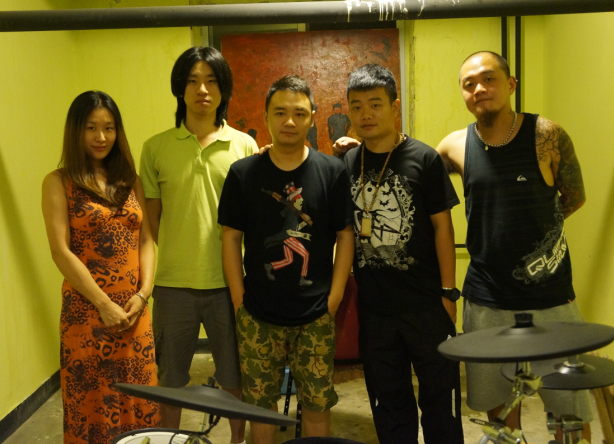Post-80s musician forms band with Beijing flavor
- By Wu Jin and Liu Qiang
 0 Comment(s)
0 Comment(s) Print
Print E-mail China.org.cn, September 5, 2013
E-mail China.org.cn, September 5, 2013
|
From left to right: erhu player Zhang Xiao , guitarist Zhang Qilin, lead vocalist Zhou Fei , bassist Shang Zilong and drummer Yang Yilang. [China.org.cn] |
Wearing a loose T-shirt and a pair of baggy shorts, 31-year-old Zhou Fei, the singer and founder of music band Journey to the West explains he now does everything he has ever dreamed of; making music, having his own band and not having to study for subjects he detests.
Having been trained in music since he was 3 years old, he believes music has always composed an inseparable part of his life.
"Many people who used to play music and eventually gave up, are those who did not learn music from the very beginning," Zhou said, "I had to study the piano at 3 years old and it is very difficult for me now to just quit."
Despite his rebellious streak and straightforwardness shared by many native Beijing boys, Zhou experienced an adolescence quite different from that of his peers, who spent most of their time vying for academic achievements. At 15, Zhou had already been a keyboard player in the Ziyue Band, moderately well-known band for its music in a nutrition advertisement (Naobaijin) and the end song of popular Chinese TV Series "Striving."
He was with the band for almost eight years. However, as he calmed down with age, he began to worry about his future. "As a musician, I often worry about things that could happen such as my band sacking me." So he left the band and started a new chapter in his career by recording his first individual album; it did not sell well.
He only sold 300 albums out of 1,000 in total, no matter how he promoted the record; listeners just did not buy the concept. Fortunately, it's not in Zhou's character to easily give up defeat. In 2009, he set up his own band, made up of drummer Yang Yilang, guitarist Zhang Qilin, bassist Shang Zilong and erhu (a traditional Chinese two-string musical instrument) player Zhang Xiao.
Zhou named the band Journey to the West, after his favorite Chinese classic novel, which was adapted for TV screens in 1986. He still remembers how in the last sequence, the Monkey King comforted his Shifu over a destroyed chapter of the Sutras (sacred texts), saying Earth and Heaven all have their individual blemishes, as do the Sutras.
"It is similar to music. I never pursue perfection because I know there is none of this in the world," Zhou said.
Unlike some bands, which focus only on music, Zhou has done a lot of things to advertise and commercialize his band. He played at commercial events, received a sponsorship from an American company called Kirlin, as well as competed for eligibility to perform at the CCTV Spring Festival Gala, an opportunity for ambitious artists to rise to stardom. (Click here to watch the band's show at CCTV)
"I would never give up the opportunity to earn ourselves a living. Because the financial support could unite me and the rest of the band even closer," he said.
Money does matter, but this does not by any standard mean his band can accept just anything and everything. There is a clear bottom line. "I still consider myself an artist and what I play is all for the sake of music." Zhou explains.
To create his own style, he integrated crosstalk into his songs's lyrics, such as "Linglong Pagoda" and "Selling clothes," which won the band recognition and popularity.
Born to a native Beijing family, Zhou started listening to crosstalk when he was only a child. His father used to listen to the radio crosstalk wherever he went and the habit exerted a great influence on his son, who also has developed an immense interest in the art.
"I hope I can attract more young people to the traditional art through our songs," he said.







Go to Forum >>0 Comment(s)